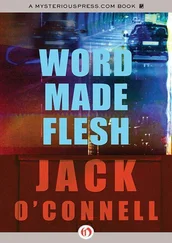They begin to hear a distant sound, a clicking, like tap shoes walking across a concrete floor. The noise increases and Jakob knows it’s being enhanced by a fairly sophisticated sound system.
Finally, a figure emerges onto the stage and walks in an odd, kicking march-step out into the path of the white spotlight. It’s a tall, bulky, bald man, dressed in a tuxedo. The man’s head is massive and the skull gleams under the spot. The man turns right and then left, though there’s no one else in the theatre beyond the four guests in the front row. The man brings a hand to his forehead as if to salute, but instead only shields his eyes and looks down on his audience, to whom he now gives an elaborate, lengthy bow.
“The Esteemed Family Kinsky,” he says. “It is my great honor to entertain you tonight. I am,” a pause, “Hugo Schick.”
Jakob feels there should be applause. The moment calls out for it. The entrance was built for applause. But instead, cousin Felix calls out, “We’re not here to be entertained.”
Gustav Weltsch grinds his teeth, but Hermann says nothing, just stares up at this ego-fat lamb begging for slaughter. Hugo Schick is thrown off, but only for a moment. His recovery is admirable and telling. He begins to nod and moves forward to the lip of the stage.
“Of course, you are right,” he says. “I was merely attempting to give you a sense of the majesty of our surroundings. I have forgotten your interest lies elsewhere.”
“It’s a magnificent theatre,” the voice unexpected and totally out of character.
Felix turns to look at Jakob, to see if the kid has lost his mind. He waits for Hermann’s elbow to crash into the son’s ribs and is shocked to see another, entirely different reaction. Hermann Kinsky is beaming at Jakob. Nodding, smiling. He claps the boy on the back and says, “You are right, my son. You are absolutely right. Magnificent is the word. Forgive our rudeness, Mr. Schick. We were, perhaps, overcome by the grandeur.”
Even Weltsch looks confused. This is not a good turn of events. When Hermann decides on a course of action, even if it’s the choice of a restaurant or a newspaper, he never wavers. When the event is a crucial business meeting, he becomes resolve incarnate. What the hell is going on here?
Hugo Schick claps his hands together, forgets his improvised “let’s-get-down-to-numbers” tack, and falls back to the “impress-the-peasant-wise-guys” routine he’s worked out all week.
“There are bigger theatres,” Schick says in a grand opera voice. “The Congress in Chicago. The Valencia in Queens. Surely, The Million Dollar in LosAngeles—”
“The Paramount in Oakland.”
“Excuse me,” Schick says.
“The Paramount,” Jakob says. “It originally had three thousand, four hundred and seventy-six seats.”
The expression on Schick’s face grows more smug than distracted.
“How delightful,” he says. “We seem to have an expert on out hands.”
“The boy likes the movie shows,” Hermann says.
“How wonderful for the boy,” Schick says.
Hermann nods and stares at Jakob, then he rises out of his seat and walks to the stage and grasps the brass railing, his head now level with Hugo’s shoes. He looks straight up to the domed ceiling, stares at a mural, a reproduction of Saturn Devouring his Children.
Hermann lowers his voice and says, “How much money do you need, Mr. Schick?”
Felix and Weltsch stare at each other, horrified.
Hugo is taken off-guard. He’d been told Kinsky would make him grovel. Now he’s not sure what to do. Figures are running through his head, inflating themselves as they go.
“I’m really not …” Schick begins. “I wasn’t prepared, that is, there are many, you see,” he takes a breath, begins again. “There is the restoration itself. And then the production expenses. The distribution costs. I don’t know where to—”
Hermann cuts him off.
“This is my attorney,” thumbing over his shoulder in Weltsch’s direction. “He’ll draw up the terms of our agreement tonight and have the paperwork on your desk in the morning. You will determine how much of an infusion is required and we will fill in the blanks when we sign the contracts. This is acceptable?”
Hugo doesn’t know what to do beyond tug at the collar of his shirt.
“Mr. Kinsky,” he finally says, “don’t you even want a tour of the building?”
“That won’t be necessary,” Hermann says. “I’m sure you are a very busy man.”
“But, Mr. Kinsky, we haven’t even discussed—”
Hermann waves away the objection.
“We are both very busy men, yes? You will find my terms the most reasonable in Bangkok, Mr. Schick. You will profit and I will profit. The technicalities are all very standard and, I assure you, exremely boring for men of vision like ourselves.”
“But, Mr. Kinsky—”
Hermann brings an index finger to his lips to indicate the need for quiet, then he says, “There is, however, one unusual condition to my approval of our venture.”
“Condition,” Schick says.
Kinsky’s finger floats out into the air and becomes a beckoning tool, calling Hugo forward. Schick squats down and duck-walks a few steps to the edge of the stage, turns his ear toward Hermann.
“It’s my son,” Hermann says, “my boy, Jakob. He’s a brilliant young man. Very creative.”
“Creative,” Hugo whispers and the sound carries around the theatre.
“You would find him extremely helpful in your line of work,” Hermann says.
“I’m afraid I don’t—”
“Men like you and I, Mr. Schick, we need all the help we can get, yes? Our burdens are very great.”
“You want me to hire—”
“I believe the phrase is assistant director, yes?”
“Mr. Kinsky,” Hugo says, “I already have—”
“You look at your staff tonight,” Hermann says. “You see if you have need for this assistant director. My attorney will come by in the morning. You tell him your decision then.”
And then Hermann does the signature belittlement. Before Hugo Schick can respond, before he can speak or even change his posture, Hermann Kinsky pats him on the head like a dog, like a Viennese mongrel he stumbled upon in the park. Kinsky turns and moves for the center aisle, snapping for his people to follow him at once. Weltsch and Felix bound from their seats and parade to the exit behind their leader.
But Jakob lingers for a moment, staring at the theatre, pivoting his head in a slow pan, trying to take as much in as the darkness will permit.
He comes to Hugo Schick, still squatting, watching the hulking shadow of Papa exit the theatre. At the back of the hall, the doors swing open and closed.
Hugo looks down at the boy, takes a breath and says, “It will be a pleasure working with you, son.”
There are probably things Sylvia hates worse in this life, but right now, standing at Perry’s side like this well-groomed, brain-addled, pseudo-spouse, listening to Ratzinger hold court with his circle of pre-partner associates, she can’t think of one. Every time this guy makes another denigrating joke about his wife, she digs her nails deeper into the palm of Perry’s left hand. There’s a sycophant tax guy named Gordon-something who’s choking himself on forced laughter, spilling shrimp cocktail sauce on his designer tie. Sylvia’s feet are killing her and the room is too hot. She wants to be home. She wants to be down in the cellar. Down in the darkroom with the Aquinas on the worktable, going over the instruction book step-by-step, removing and installing the lens. Maybe even hooking up a flash and shooting some of those Polaroids.
Читать дальше











